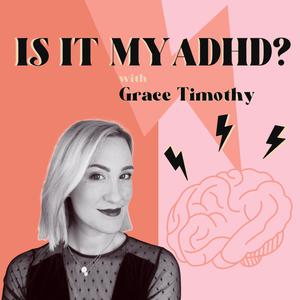
Is It My ADHD?
The Tape Agency
With Grace Timothy
- 12 minutes 17 secondsTHE BIG ANNOUNCEMENT…
Right up to the age of 37, I wondered: what is wrong with me? Why do I always feel like I am other, I am different, I am an outsider? Considering I am a white, non-disabled, cis-gendered, heterosexual person, this was not an othering shaped by our intolerant society; In every sense of the word, I am privileged. But I am also just plain wrong. I was self-conscious about something nobody could see. I rarely felt safe in my surroundings, and I would only know ‘normal’ by its absence in my head.
Of course, in 2021 I got my answer – I have combined type ADHD. But far from being the answer, it just set off a string of new questions for me, and what followed was a lonely time filled with grief, anger and confusion. I had to sit on these questions because, even if I could have afforded it, they weren’t really fit for the psychiatrist’s chair. I desperately wanted to understand something that was still relatively unknown – living as a woman with ADHD was still a mysterious, seemingly under-researched subject.
I’ve loved having the opportunity to explore this condition with you all via the podcast for the past few years. And now there is more – I’ve written a book! AN ACTUAL BOOK! It’s everything I wish I’d known back then when my assessment ended, and even further back than that, what would have helped to read as a teenager who was always wondering what the hell was going on. IS IT MY ADHD, THE BOOK, IS AVAILABLE TO PRE-ORDER TODAY!
I wanted to talk a bit about why I wanted to write this book, so this episode delves a little deeper into my story, how I got here and what you can expect from the book.
Now, it’s not out until February 2025, but you can pre-order it now, and I’m told the more pre-orders that are made now, the more visible the book will be to customers. So if you’re keen to read it and delve deeper into the stories of myself and an amazing community of other women and non-binary people, now is a great time to order IS IT MY ADHD the book, and it’ll land on your doorstep as soon as it’s published!
Thank you for the huge part you have played in making this book possible simply by listening to the podcast.
Learn more about your ad choices. Visit megaphone.fm/adchoices
25 June 2024, 2:00 am - 36 minutes 35 secondsPART TWO: RELATIONSHIPS with Jessica Kellgren-Fozard
Relationships are bound to be impacted by ADHD, and if you’re living with your partner and they’re therefore privy to your most private moments, it can be a lot. We’ve explored the world of dating, but how does ADHD affect long-term relationships? People with ADHD might be spontaneous, passionate, intuitive, fun and creative, but inevitably other traits might come into play, such as conflict seeking behaviour, impatience, mood swings, irritability, recklessness, overwhelm and rejection sensitive dysphoria. I’ve been with my husband for nearly 20 years, and am very aware of his strengths in supporting me. But what if both partners have ADHD? Does this meeting of shared needs make for a supremely supportive, understanding and balanced partnership? Today, I’m joined by Jessica Kellgren-Fozard. A prolific vintage style content creator and YouTuber, Jessica is also a deaf and disabled activist, advocating for LGBTQ+ lives, and is one half of Jessie & Claud, where she and her wife share their experiences as Montessori mothers to their son, Rupert.
In this second instalment of my chat with Jessica, we discuss what it was like growing up at the intersections of undiagnosed ADHD and chronic illness, focusing largely on how the school years went. Jessica talks about her deafness and how this in many ways masked her ADHD. We discuss emotional lability in a relationship, how she and Claudia support one another, and how Claudia helps manage her symptoms.
If you missed part 1, check it out wherever you get your podcasts, to hear about how Jessica met her wife Claudia, about how the dynamic shifts when you have a child, the differences between them and how that can create both balance and tension. We also talk about the challenges of rejection sensitivity. And now back to the chat with Jessica.
Follow me here
You can find Jessica on Instagram here.
Jessica is also on YouTube.
If you are experiencing any issues with your medication, consult your doctor. Please note, your first port of call if you think you might have ADHD should be your GP. In the meantime, you can find more information here:
Understanding ADHD in Girls and Women, by Joanne Steer
Huge thanks to The Tape Agency for making this two-part special and taking such good care of me.
Please note, your first port of call if you think you might have ADHD should be your GP. This podcast is no substitute for professional medical care or diagnosis. In the meantime, you can find more information here:
Learn more about your ad choices. Visit megaphone.fm/adchoices
18 June 2024, 2:00 am - 33 minutes 44 secondsPART ONE: RELATIONSHIPS with Jessica Kellgren-Fozard
Relationships are bound to be impacted by ADHD, and if you’re living with your partner and they’re therefore privy to your most private moments, it can be a lot. We’ve explored the world of dating, but how does ADHD affect long-term relationships? People with ADHD might be spontaneous, passionate, intuitive, fun and creative, but inevitably other traits might come into play, such as conflict seeking behaviour, impatience, mood swings, irritability, recklessness, overwhelm and rejection sensitive dysphoria. I’ve been with my husband for nearly 20 years, and am very aware of his strengths in supporting me. But what if both partners have ADHD? Does this meeting of shared needs make for a supremely supportive, understanding and balanced partnership? Today, I’m joined by Jessica Kellgren-Fozard. A prolific vintage style content creator and YouTuber, Jessica is also a deaf and disabled activist, advocating for LGBTQ+ lives, and is one half of Jessie & Claud, where she and her wife share their experiences as Montessori mothers to their son, Rupert.
In this first part of our chat with Jessica, she shares how she met her wife, Claudia; how the relationship dynamic shifts when you have a child; the differences between how ADHD shows up for them and how that can create both balance and tension. We also talk about the challenges of rejection sensitivity.
Join us again next week for the second instalment of my chat with Jessica, when we’ll discuss emotional lability in a relationship, how she and Claudia support one another, and how Claudia helps manage her symptoms.
In a slight twist on our usual format, we have decided to share YOUR questions with the experts. This week, we ask Dr Jo Steer, a clinical psychologist and author of Understanding ADHD in Girls & Women: what is caused by ADHD and what is caused by trauma?
Follow me here
You can find Jessica on Instagram here.
Jessica is also on YouTube.
If you are experiencing any issues with your medication, consult your doctor. Please note, your first port of call if you think you might have ADHD should be your GP. In the meantime, you can find more information here:
Understanding ADHD in Girls and Women, by Joanne Steer
Huge thanks to The Tape Agency for making this two-part special and taking such good care of me.
Please note, your first port of call if you think you might have ADHD should be your GP. This podcast is no substitute for professional medical care or diagnosis. In the meantime, you can find more information here:
Learn more about your ad choices. Visit megaphone.fm/adchoices
11 June 2024, 2:00 am - 22 minutes 1 secondPART TWO: LEARNED HELPLESSNESS with Bay Garnett
Welcome to the second episode in our deep dive into learned helplessness with stylist, editor and author of Style & Substance, Bay Garnett. We talk about unlearning learned helplessness, how she’s learning to plan and think a few steps ahead since she was diagnosed, and feels more able to try new things she previously thought she would never be able to master. She reveals how she shows up as her authentic self, the ways in which her family often steps up to help with tasks she finds challenging and the positive impact it’s had on her kids.
In a slight twist on our usual format, we have decided to share YOUR questions with the experts. This week, we ask Dr Mohamed Abdelghani, a lead consultant psychiatrist specialising in ADHD in adults at Nurify Medical in London: how do you know if you’ve reached a plateau with your medication and either need to adjust the dose or try a new medication?
Check out the first episode of this 2-part feature with Bay to hear more about bunking off school, growing up feeling inadequate and how Bay unwittingly shaped a career that made the most of her strengths and mitigated the challenges she’d face around admin and organisation.
Follow me here
You can find Bay on Instagram @baygarnett and her book, Style & Substance: Why What We Wear Matters is available here
You can also listen to Bay’s podcast, This Old Thing, wherever you get your podcast from.
If you are experiencing any issues with your medication, consult your doctor. Please note, your first port of call if you think you might have ADHD should be your GP. In the meantime, you can find more information here:
Understanding ADHD in Girls and Women, by Joanne Steer
Huge thanks to The Tape Agency for making this two-part special and taking such good care of me.
Please note, your first port of call if you think you might have ADHD should be your GP. This podcast is no substitute for professional medical care or diagnosis. In the meantime, you can find more information here:
Learn more about your ad choices. Visit megaphone.fm/adchoices
3 June 2024, 11:00 pm - 30 minutes 25 secondsPART ONE: LEARNED HELPLESSNESS with Bay Garnett
Today I speak to the stylist, editor, podcaster and author of Style & Substance, Bay Garnett, just one year on from her ADHD diagnosis. While we amble through our shared memories and her career as a stylist, we also dive deep into the issues of learned helplessness with someone for whom the discovery is still quite fresh. The concept of Learned Helplessness was established by American psychologist, Martin Seligman in 1967, and it’s essentially the theory that when a person or animal learns to accept and endure an unpleasant event and no longer tries to avoid or adapt, even when it can be easily avoided, they have been conditioned to think they have no power over their situation. It’s something commonly seen with ADHD, especially those diagnosed later in life, as we repeatedly try and fail to perform as we’d wish. It becomes easier – emotionally and physically – to avoid that activity altogether. It’s something I can identify in several of my own issues, from putting together flat pack furniture to changing passwords online.
Bay - one of the best loved multi-hyphenates of the fashion world – and I first met about 15 years ago at Vogue, when she was styling the likes of Sophie Dahl for cover shoots, championing vintage and second-hand clothing. It was great to be able to reflect on that time together through the lens of ADHD, and share the experiences that led Bay to seek an assessment last year.
We discuss growing up ‘on the outside’ of things, feeling incapable at school and bunking off, and how that develops into adulthood, in your career, within your family dynamic and in day-to-day living. Bay shares how she still isn’t sure she knows what she’s ‘good at’, after years of feeling inadequate, but has unwittingly shaped a career that would make the most of her strengths and largely reduce the number of challenges she would face around admin and organisation. She reveals what it’s like to work at VOGUE when you’ve got ADHD, what it feels like to lose things and how people often show up for you in those scenarios.
In a slight twist on our usual format, we have decided to share YOUR questions with the experts. This week, we ask Dr Mohamed Abdelghani, a lead consultant psychiatrist specialising in ADHD in adults at Nurify Medical in London: how do you know if your ADHD meds are working? How should you ideally feel on them?
Follow the podcast for the next episode of this 2-part feature with Bay, where we explore what follows a diagnosis, how Bay is unlearning learned helplessness and the positive impact her ADHD has had on her kids.
Follow me here
You can find Bay on Instagram @baygarnett and her book, Style & Substance: Why What We Wear Matters is available here
You can also listen to Bay’s podcast, This Old Thing, wherever you get your podcast from.
If you are experiencing any issues with your medication, consult your doctor. Please note, your first port of call if you think you might have ADHD should be your GP. In the meantime, you can find more information here:
Understanding ADHD in Girls and Women, by Joanne Steer
Huge thanks to The Tape Agency for making this two-part special and taking such good care of me.
Please note, your first port of call if you think you might have ADHD should be your GP. This podcast is no substitute for professional medical care or diagnosis. In the meantime, you can find more information here:
Learn more about your ad choices. Visit megaphone.fm/adchoices
27 May 2024, 11:00 pm - 36 minutes 37 secondsPART TWO: AUTISM AND ADHD with Char Bailey
In the first of this 2-parter on autism and ADHD, we established how to two differ, what symptoms they share, and what it feels like to have both, with Char Bailey, the Director of People for Birmingham Pride, writer for DIVA and tireless autism advocate. In this second episode on ASD and ADHD, Char shares the biggest challenges she faces on a daily basis, familial relationships and accountability, where Char’s perspective has turned the whole concept on its head for me. She reveals what her old coping mechanisms were pre-diagnosis, what she’s learnt since being diagnosed and why she’s not bitter about what came before.
In a slight twist on our usual format, we have decided to share YOUR questions with the experts. This week, we ask Dr Jo Steer – a chartered clinical psychologist working with children in Surrey and author of Understanding ADHD in Girls and Women – are BFRBs common in ADHD, and if so, why?
Follow the podcast for the first episode of this 2-part feature with Char, where we discuss her autism diagnosis, what it’s like to have both and how she protects her mental health.
You can find Char on IG @char_bailey_ and here on LinkedIn
Follow me here
Huge thanks to The Tape Agency for making this two-part special and taking such good care of me.
Please note, your first port of call if you think you might have ADHD should be your GP. This podcast is no substitute for professional medical care or diagnosis. In the meantime, you can find more information here:
For further reading, try How Not to Fit In by Jess Joy and Charlotte Mia.
Learn more about your ad choices. Visit megaphone.fm/adchoices
20 May 2024, 11:00 pm - 33 minutes 9 secondsPART ONE: AUTISM AND ADHD with Char Bailey
The prevalence of ASD is higher in patients with ADHD than in the general population. That said, the research into the dual-diagnosis is still fairly scant (it’s only been recognised as such for about a decade), and of course having both can complicate the identification and treatment of either condition.Both ADHD and ASD can cause heightened sensory issues, defiant behaviours, emotional dysregulation and issues with working memory, processing speed and response inhibition. It’s just that the root cause of those behaviours differ.What’s it like to have both? Do they balance and support each other, or is there a constant tension between the need for routine and repetition and a restlessness that impedes delivery and staying on task?Today, I’m joined by Char Bailey, the Director of People for Birmingham Pride, writer for DIVA and tireless autism advocate, who is now exploring her ADHD.
In this episode – part 1 of 2 - we discuss what it feels like to have both ADHD and ASD, the tensions between the two and how Char strikes a balance by leaning into the driving force. Char shares how the intersections of race, sexuality and neurodivergence have shaped her experience, and describes the ways in which she manages her symptoms so as to protect her mental health. I cannot recommend this episode highly enough, whether you have ASD, ADHD, both or neither – Char is such a force for good in the world and drops so many nuggets of absolute genius here. Follow the podcast for the second episode on autism and ADHD, back with Char to discuss staying positive, accountability, familial relationships and how to navigate this dual diagnosis.
In a slight twist on our usual format, we have decided to share YOUR questions with the experts. This week, we ask Dr Jo Steer – a chartered clinical psychologist working with children in Surrey and author of Understanding ADHD in Girls and Women – how do you feel about self diagnosis, is it valid or dangerous?
You can find Char on IG @char_bailey_ and here on LinkedIn
Follow me here
Huge thanks to The Tape Agency for making this two-part special and taking such good care of me.
Please note, your first port of call if you think you might have ADHD should be your GP. This podcast is no substitute for professional medical care or diagnosis. In the meantime, you can find more information here:
Learn more about your ad choices. Visit megaphone.fm/adchoices
13 May 2024, 11:00 pm - 27 minutes 19 secondsPART TWO: ‘Grace, where have you been?’ with Stacey Heale
‘People with ADHD will burn out more quickly, because it takes them more effort and mental work to do what could be seen as to be done effortlessly by other people. If we’re serious about this, we need to support people during the build-up rather than just see them when it’s too late and they’re in full burnout.’ Dr Mohamed Abdelghani
Today, I’m joined by fashion academic and the author of ‘Now is Not the Time for Flowers’, Stacey Heale, for a deep dive into the real lived experience of ADHD burnout.
When I started the podcast, I was in a really good place. I knew ADHD was going to impair my abilities in various ways, but if I’m totally honest, I felt like I’d largely mastered ADHD. Like, not only had I done the research and felt so very self aware, but I was also just feeling quite together. To the point where I’d look at the supposed impairments identified in my assessment report and think, nahhh! I’ve got this all sorted. But that was an illusion!
As someone who felt largely incapable of life, it’s a very sexy feeling, smashing through a to-do list, making things happen. Being good at things. When this is in motion, I go in hard. Overextension needs to last just long enough to finish the job. As I get older, it feels like this is what is most precarious – how long will I last? Then the body can’t keep up with the mind, and I slide into burnout. I can’t seem to predict when it’ll happen – my capacity, I guess, is constantly shifting.
I used to quit when this happened. But the truth is, I’m no longer in a stage of life where I can afford to quit. I have to have bad days and come out the other side. And here’s the thing – yes, I was working hard and having to juggle it with my other responsibilities, but I have to acknowledge: nothing was that bad, you know? It wasn’t the back-to-back surgeries I know ADHD friends have to work through, or a case of battling against roadblocks and toxic relationships. I had support. And nothing went wrong as such – there was no cataclysmic shortfall. But still – I’d never been down this close to rock bottom.
So, what’s next? I have to work out how gingerly I need to approach work, what are my limits and when do I need to ask for help.
Why didn’t I share this sooner? It pains me to even share it now, to be honest, because I want to be employable – I don’t want to show that weakness that might make mine the LinkedIn profile a prospective boss flicks straight past, or think that colleagues are having chats about me in hushed tones. I don’t want my choices to be questioned or my mistakes to be seen as indelible examples of who I really am. I just want to be on an equal footing with everyone else and to be given the benefit of the doubt.
In this second episode, Stacey and I explore the clinical picture of burnout; Stacey’s experience of on-going burnout in the aftermath of her husband Greg’s death, and what we should be doing to refuel our systems.
If this is your first episode, be sure to check out part one. There’s more vulnerability than I think I ever wanted to bring to the podcast as host, but I hope it’ll be helpful in understanding yourself and others who might go through something similar.
Stacey Heale – who was diagnosed with ADHD in 2023 - is a fashion academic, mum of two and the author of ‘Now Is Not The Time For Flowers’, which is available to buy here
Follow Stacey here
Follow me here
Huge thanks to The Tape Agency for making this two-part special and taking such good care of me.
Please note, your first port of call if you think you might have ADHD should be your GP. This podcast is no substitute for professional medical care or diagnosis. In the meantime, you can find more information here:
Learn more about your ad choices. Visit megaphone.fm/adchoices
28 March 2024, 3:30 am - 35 minutes 28 secondsPART ONE: ‘Grace, where have you been?’ with Stacey Heale
In this episode, we turn the tables slightly and I become the interviewee because I’ve got some home truths to share. I’ve been withholding slightly, and it’s time to be honest. So, I feel very lucky that Stacey Heale – author of ‘Now is Not the Time for Flowers’ – is joining me as the host of a two-episode special where I come clean.
The theme is burnout, something I know many of you have experienced in a variety of ways, and a common occurrence in people with ADHD. Stacey and I have both been through it in different ways for different reasons, and this deep-dive went so deep, we’ve had to split it into two episodes. This first episode is all about what happened, where I’ve been and what went down.
Together we explore the ‘pure ecstasy of hyperfocus’; the mental and physical toll of masking; the warning signs of burnout; the pressure we put upon ourselves, and what it feels like to go through burnout, which is not at all what I expected.
Follow/subscribe so as not to miss part two. There’s more vulnerability than I think I ever wanted to bring to the podcast as the host, but I hope it’ll be helpful in understanding yourself and others who might go through something similar.
Stacey Heale – who was diagnosed with ADHD in 2023 - is a fashion academic, mum of two and the author of ‘Now Is Not The Time For Flowers’, which is available to buy here
Follow Stacey here
Follow me here
Please note, your first port of call if you think you might have ADHD should be your GP. This podcast is no substitute for professional medical care or diagnosis. In the meantime, you can find more information here:
Huge thanks to The Tape Agency for making this two-part special and taking such good care of me.
Learn more about your ad choices. Visit megaphone.fm/adchoices
21 March 2024, 3:30 am - 5 minutes 59 secondsAN UPDATE FROM GRACE
In this mini episode Grace has an update for listeners.
Books I’ve been reading:
The Mini ADHD Coach by Alice Gendron
Scatter Brain by Shaparak Khorsandi
Dancing on Eggshells by John Waite
Please note, your first port of call if you think you might have ADHD should be your GP. In the meantime, you can find more information here:
Learn more about your ad choices. Visit megaphone.fm/adchoices
30 November 2023, 3:30 am - 48 minutes 51 secondsGemma Styles- ADHD & DEPRESSION
Whilst it’s true that many people with ADHD are misdiagnosed with depression, it’s important to remember that depression is one of the most common comorbidities of ADHD. The two can absolutely exist in combination, and there is a lot of conjecture that until we tackle ADHD, depression can’t be properly treated. But as Gemma Styles points out, depression doesn’t just disappear the minute you’ve received an ADHD diagnosis.
Gemma Styles is a writer, the host of the Good Influence Podcast and an ambassador for the charity, MQ Mental Health Research. She is a warm and insightful voice in the spaces of mental health, feminism and sustainability, using her platform to drive awareness and action across a variety of issues. She talks very openly about her own mental health, but only recently received a diagnosis of ADHD after years spent dealing with anxiety and depression.
In this episode, we talk about what it’s like to have ADHD and depression, and Gemma shares how her ADHD diagnosis represented a shift in how she experienced depression. We explore helpful accountability, the inability to initiate tasks and how those experiences are common to both depression and ADHD. Gemma describes the shame we carry, how the advocacy of family and friends was a game-changer, and we discuss our shared frustration over how unhelpful the ‘ADHD is a superpower’ model can be.
Listeners can use the code LOOPXISITMYADHD for 15% off
You can find Gemma at GemmaStyles.com and on Instagram
Her podcast, Good Influence is on all podcast platforms
Please note, your first port of call if you think you might have ADHD should be your GP. In the meantime, you can find more information here:
Learn more about your ad choices. Visit megaphone.fm/adchoices
29 June 2023, 2:30 am - More Episodes? Get the App
Your feedback is valuable to us. Should you encounter any bugs, glitches, lack of functionality or other problems, please email us on [email protected] or join Moon.FM Telegram Group where you can talk directly to the dev team who are happy to answer any queries.
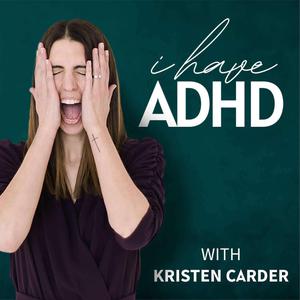 I Have ADHD Podcast
I Have ADHD Podcast
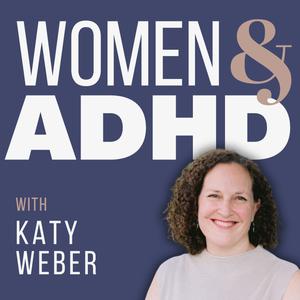 Women & ADHD
Women & ADHD
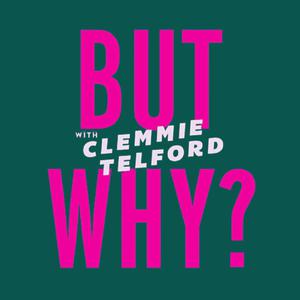 But Why?
But Why?
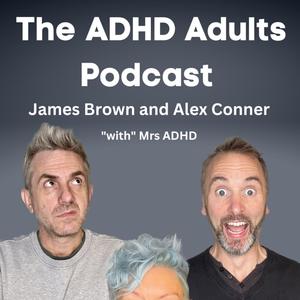 The ADHD Adults Podcast
The ADHD Adults Podcast
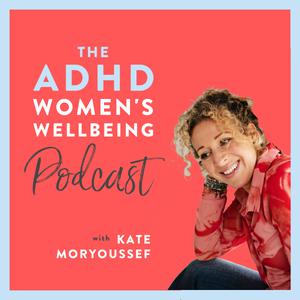 The ADHD Women's Wellbeing Podcast
The ADHD Women's Wellbeing Podcast